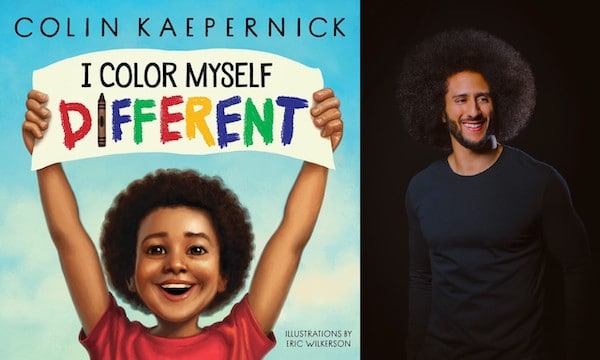In this series, we ask acclaimed authors to answer five questions about their book. This week’s featured author is Colin Kaepernick . Kaepernick is a professional NFL Super Bowl quarterback who fights oppression globally. He founded the Know Your Rights Camps to advance the liberation and well-being of Black and Brown people through education, self-empowerment, mass-mobilization, and the creation of new systems that elevate the next generation of change leaders. In 2020, he started Kaepernick Publishing to elevate a new generation of writers and creators through the development and publication of meaningful works of all genres with the focus of amplifying diverse views and voices. His book is I Color Myself Different .
Roberto Sirvent: First off, congratulations on the publication of your children’s book, I Color Myself Different. Can you please share how you came up with the idea to write a children’s book, and why it was so important for you to tell this particular story?
Colin Kaepernick: The idea for I Color Myself Different had been circulating in my mind long before I put a pen to the page, in part, because the story is based on an actual moment from my childhood. When I was in kindergarten, I was given a seemingly straightforward assignment in school: “draw a picture of yourself and your family.” So, I grabbed a yellow crayon to draw my white adoptive family and then exchanged it for a brown crayon to draw myself. This moment was pivotal for me because it really represented the first time in my life I consciously saw myself as “different” from the rest of my family. Though I didn’t have the language for it at the time, this inflection point helped me to understand how my brown skin was connected to my Blackness.
RS: How do you hope this book will be used in schools, but also in community reading groups outside of traditional educational spaces?
CK: I think different audiences will approach this book from different angles and access it through different entryways. My deepest hope, though, is that I Color Myself Different encourages young people–especially Black and Brown youth–to embrace their unique power to change the world. I’d be honored if this book were included in all types of curricula–both in conventional and non-traditional educational spaces. The construction of the book itself reflects this spirit, I think. The back of the book includes short bios of Black freedom fighters featured in the story and could be folded into lesson plans in a number of dynamic ways.
RS: What was your favorite part about writing the book? I understand you also helped a little with the illustrations? Please tell us more!
CK: Even though my original drawing from kindergarten served as the basis for the book, let’s just say that I’m grateful for illustrator Eric Wilkerson’s talents! Eric did an amazing job bringing this complex story to life with nuance, truth, and vibrancy. My favorite part about writing this book is knowing that it may be useful to some young readers. Having access to a book like this when I was a kid would have gone a long way. I think Toni Morrison once said that “if there’s a book you want to read, but it hasn’t been written yet, then you must write it.” So, that’s what I did.
RS: What were some of your favorite books growing up? Did you ever read a book on your own or with a group of friends and then thought to yourself, “How come I wasn’t assigned this in school?”
CK: Growing up, I loved to read. However, I can’t say that as a kid I had a lot of “favorite” books. One exception was We’ll Never Forget You, Roberto Clemente. Reading this book was arguably the first time I could relate to a character in a published story. Not having many “favorite” books as a kid is really the consequence of not having books at my disposal that reflected my own identity and experiences. This is exactly why I wrote I Color Myself Different. I want kids–particularly Black and Brown youths–to see themselves as central to the stories we tell.
RS: You recently edited a fantastic book called Abolition For The People: The Movement For A Future Without Policing & Prisons. I Color Myself Different also engages creatively with issues of love, freedom, and liberation. What advice would you offer organizers, artists, parents, and other intellectuals who want to raise their children as abolitionists?
CK: Love, freedom, and liberation are core to the mission of Kaepernick Publishing. The two titles you mentioned are now part of our growing catalog. Our third book drops on October 18, 2022. It’s called In the Blink of an Eye and is the autobiography of NBA legend Mahmoud Abdul-Rauf.
To your question: raising kids capable of challenging the many violences of dominant U.S culture–including but not limited to violence of the prison industrial complex–is a massive collective undertaking. I’m not a parent but I imagine it requires great love, intentionality, community, and creativity to model the idea that a different world–a better and more just world–is possible. It’s an everyday practice. I have a lot of respect for parents, teachers, and caregivers who are able to model abolitionist futures for kids everywhere.
Roberto Sirvent is editor of the Black Agenda Report Book Forum.

